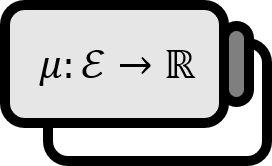Partition and Refinement of Measurable Spaces
Definition
Given a measurable space $( \Omega , \mathcal{F} )$.
A finite (measurable) partition of the measurable space $\Omega$ is defined as $$\mathcal{P} : = \left\{ A_{i} \in \mathcal{F} : i_{1} \ne i_{2} \implies A_{i_{1}} \cap A_{i_{2}} = \emptyset \right\}_{i=1}^{k}$$ that satisfies $\displaystyle \bigsqcup_{i=1}^{k} A_{i} = \Omega$ for $( \Omega , \mathcal{F} )$. If there exist $B_{j} \in \mathcal{P} ' $ that satisfy $\displaystyle A_{i} = \bigsqcup_{j \in J} B_{j}$ for all $A_{i} \in \mathcal{P}$, then $\mathcal{P} ' $ is called a refinement of $\mathcal{P}$.
- $\displaystyle \bigsqcup$ means the union of mutually exclusive sets.
Explanation
There is essentially no difference from the partition used when defining the Riemann sum. A refinement, simply put, means a more finely divided partition.
